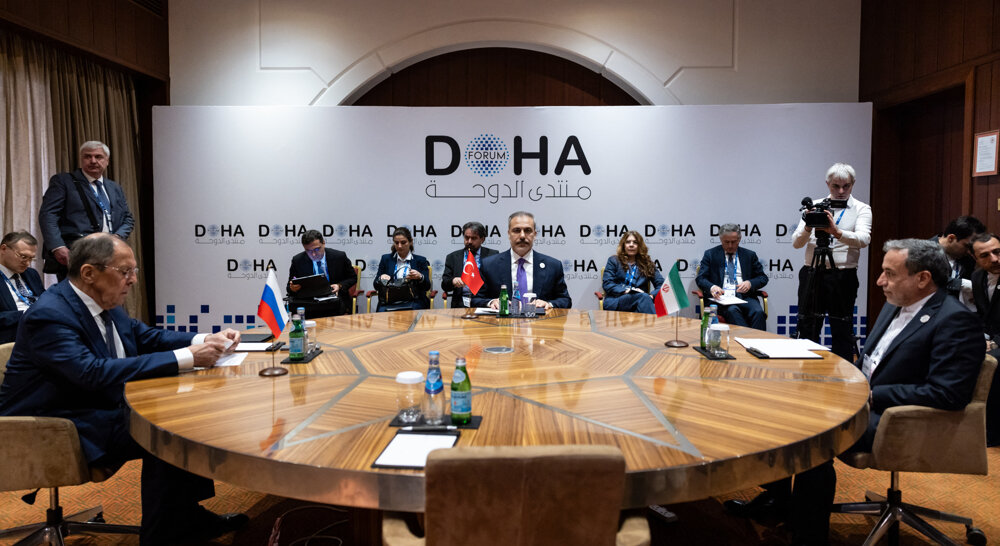Diplomatic push for Syria
Diplomatic push for Syria
TEHRAN – The foreign ministers of Iran, Turkey, and Russia convened in Qatar on Saturday for high-level talks addressing the volatile situation in Syria.

The meeting, part of the Astana peace process, came amid a surge of hostilities in the northwest of the country, where terrorists have recently seized significant territory.
Iranian Foreign Minister Abbas Araghchi emphasized the necessity of political dialogue and regional cooperation during the discussions. Araghchi has traveled to Qatar to take part in the Doha Forum 2024 and the meeting of the Astana process on the sidelines of the event.
Speaking to reporters after the session, Araghchi highlighted that the focus was on creating pathways to de-escalate tensions, restore territorial integrity, and ensure Syria’s sovereignty.
“This was a highly productive meeting,” Araghchi stated, noting that it included the participation of United Nations Special Envoy for Syria Geir Pedersen. "We agreed unanimously that hostilities must end immediately and that Syria's territorial integrity and sovereignty must be respected in line with UN resolutions."
The top Iranian diplomat underlined that political negotiations between the Syrian government and opposition groups should begin as a matter of priority. "The initiation of political dialogue is critical to achieving long-term peace and stability," he said.
The trilateral discussions occurred against the backdrop of intensified clashes in Aleppo and Idlib provinces. On November 27, the terrorist group Hayat Tahrir al-Sham (HTS) launched a major offensive, capturing strategic areas. Syrian government forces have since been engaged in fierce battles to regain control.
Syria has been engulfed in foreign-backed conflict since 2011, with Western nations and Washington’s regional allies supporting terrorist groups to destabilize the country.
In the meeting, participants voiced collective concern about the humanitarian crisis and reiterated their commitment to finding a political solution to the conflict. They also discussed the need for ongoing consultations with key stakeholders, including the Syrian government and other regional powers.
Russian Foreign Minister Sergey Lavrov, separately stated that he, along with his Iranian and Turkish counterparts, are calling for “an end to hostile activities” in Syria, where opposition fighters have made a rapid advance in a major challenge to President Bashar al-Assad.
Araghchi’s diplomatic mission in Doha extended beyond the Astana talks. He met with Sheikh Tamim bin Hamad Al Thani, Qatar’s Emir, and Sheikh Mohammed bin Abdulrahman Al Thani the Prime Minister and Foreign Minister of Qatar to discuss pressing regional crises, including the humanitarian tragedy in Gaza and the fragile situation in Lebanon.
In another significant meeting, Araghchi conferred with Turkish Foreign Minister Hakan Fidan, focusing on Syrian affairs.
Continuing his diplomatic meetings, Araghchi also had a meeting with his Saudi counterpart Prince Faisal bin Farhan.
The Iranian Foreign Minister also held discussions with Hamas leadership, including Mohammad Ismail Darwish, Chairman of the Political Council of the Palestinian Resistance Movement. These talks centered on developments in Palestine and the broader implications for regional stability.
Araghchi reaffirmed Iran’s commitment to supporting Syria during a visit to Damascus, where he met with President Bashar al-Assad. “Iran remains steadfast in its support for the Syrian government, its armed forces, and its people in their fight against terrorism,” he said, emphasizing Tehran’s dedication to maintaining regional security.
While in Baghdad, Araghchi also highlighted Iran’s readiness to assist Iraq in combating terrorism and strengthening its institutions. He stressed the importance of coordinated efforts to stabilize the region and align political strategies among neighboring countries.
Araghchi concluded his remarks by reiterating Iran's commitment to advancing dialogue and fostering cooperation. "We will continue consultations with the Syrian government, and other nations involved, to ensure progress in peace-building efforts. The Astana process remains a vital framework for addressing Syria’s challenges," he said.
The Astana talks, also known as the Astana format, were founded in 2017, with 21 meetings held to date. The Astana format includes Russia, Iran, and Turkey as guarantor countries in the process of resolving the Syrian crisis, alongside representatives of the Syrian government and opposition, the United Nations, and observer countries: Jordan, Lebanon, and Iraq.
source: tehrantimes.com